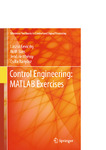| dc.description.abstract | This book is intended to aid students in their study of MATLAB™/SIMULINK™
for use in solving control problems. Specifically, 16 labs for an introductory control
course have been developed at the Department of Automation and Applied
Informatics, Budapest University of Technology and Economics. This book is a
collection of these labs. This exercise book is a supplement to the textbook “Control
Engineering,” by László Keviczky, Ruth Bars, Jenő Hetthéssy, and Csilla Bányász
[1], which is used in the control course. Each chapter of this exercise book is related
to the corresponding chapter of the textbook.
The importance of accompanying textbooks by labs using CAD software was
recognized decades ago at the department. At that time, a set of FORTRAN
libraries supported the instruction both in control systems analysis and design. We
still believe that learning control theory is best motivated by applications and
simulations rather than by concepts alone. In fact, the use of MATLAB™ allows a
lot of theoretical concepts to be easily implemented. If students can immediately
show for themselves how certain concepts work in practice, they will go back to the
theoretical considerations with greater confidence and an improved ability to move
to the next field to study. Well, feedback is around us, anyway.
The problems discussed in this book are limited to linear, time-invariant control
systems. Both continuous-time and discrete-time systems are considered, with
deterministic inputs.
MATLAB™/SIMULINK™ is useful only for those students, who master the
tools offered. Though the application of MATLAB™ commands is simple and
straightforward, a systematic introduction together with control-related examples is
a must in our opinion. Time should be devoted to practicing fundamental
MATLAB™ facilities, alternative command sequences, and visualization capabilities.
An introductory lab is devoted to demonstrating the availability and power of
MATLAB™ in this respect. | en_US |

